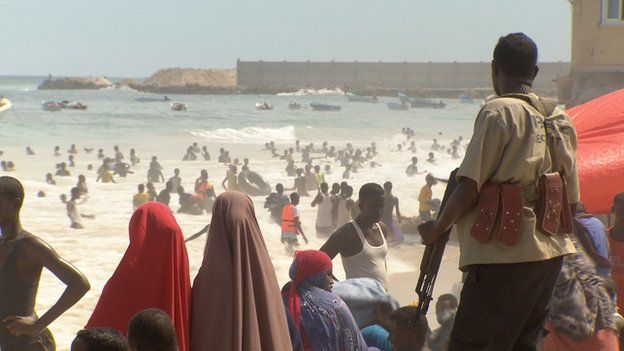Mogadishu’s Lido beach: Sun, surf and… grenades?
Abdullah Mohammed Hassan climbed down from his perch, and strolled purposefully into the sea to rescue yet another bather who appeared to be struggling against big waves and a rocky, barbed-wire-infested shoreline at Lido beach, on the northern edge of the Somali capital, Mogadishu.
“We save people here every day,” said the 46-year-old policeman – managing to sound both proud and chiding and the same time.
Mr Hassan has now spent three years assigned to the lifeguard unit that patrols the beach.
At high tide on a recent Friday afternoon, thousands of mostly young Somalis were playing in the surf – a scene of cheerful relaxation that would have been unimaginable just a few years ago in a city notorious for its decades of anarchy, famine and violence.
“This place is bangin’! Beautiful!” said an exuberant 21-year-old named Hassan Mohammed.
Like many others at the shore, he was from the diaspora and spoke English in a broad London accent.
“Never been here before. Very nice country. I’m born and raised in Europe. I thought it would be like seeing the end of the world. But it’s improved very much,” he said.
Several restaurants have opened up at Lido beach, their shaded tables packed with Mogadishu’s wealthier elites.
“Octopus, sea turtle, lobster, shrimp – it’s all over this place! Somalia is the most rich in seafood,” said Lule Dhan, an Ethiopian who is executive chef at the Benadir Beach Restaurant. “This fabulous city… is not what the media portrays,” he declared.
“Absolutely, I’m hear to stay,” said the restaurant’s slightly less effusive co-owner, Abdi Resak Jamcale, who has returned to Somalia after two decades in California.
“I’m not making a profit but I’m breaking even. We need new laws to have more foreign investment here. For years people here never knew what’s wrong and what’s right – whoever has the gun [was in control]. But we’re getting there, slowly,” he said.
In a country famous for its entrepreneurial culture, Lido beach’s popularity has attracted a range of new business ventures – the most visible being the stalls renting out bright red life jackets to the many less confident swimmers.
“When the security improves, everything gets better. Before there was no work at the seaside, but now we’re very proud to have this business,” said Mariam Hassan Ali, 45, sitting beside an inflated inner tube that she also rents by the hour.
But if Lido beach is a clear indication of the growing sense of optimism in Mogadishu, this is not a city in which one can, or should, drop one’s guard for long.

Later in the afternoon, the local district police chief arrived and demanded that we leave the beach immediately, hinting darkly that our film crew might be working on behalf of al-Shabab. To reinforce his point, he was brandishing a grenade with some enthusiasm.
Further down the beach, Hassan Mohammed – the young visitor from London – also began sounding slightly less emphatic about the city’s charms when I asked him if he had any concerns about security, and al-Shabab.
“No. No. You talk about that and they’ll come to you! You don’t talk about that – not even a little bit. I’m scared of that. This country’s un-trustable, the people are un-trustable. They’re just like you but then they’ve got this different mentality.
“There’s only certain people that you can trust but that’s cos they’re your family. Do you know what they say here [about al-Shabab]? Arsenal or Chelsea! They don’t even call them by their name. They say Arsenal or Chelsea. And if you hear that, run! Run! Don’t even turn around. Just run!” he said.
BBC
